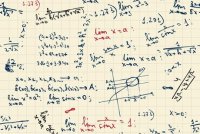Teenagers and Abstract Thinking: Unclear on the Concept?
The frustrations teenagers experience with school are more a case of statistics and lack of experience than that of work ethic or "attitude" problems. These statistics are not tied to socioeconomic status, weight or time spent in a seat; they're genetic and experiential. We have a bell curve of abstraction and experience, and we're only beginning to think about how to honor that.
My working, classroom definition of abstraction is the ability to simultaneously consider multiple states of a system in order to analyze it for patterns, behavior and predictability. It's something like the difference between solving an equation for a specific value of x and being able to suggest different slopes and intercepts that would model data well.
Piaget1 explained this stage as "Formal Operational," and he claimed this abstract level of thinking begins to develop in the early teen years. He's right, but the differences between peers of the same age can be so drastic that we must seriously consider how any mathematics (not arithmetic) curriculum should be introduced to students.
Anecdotal Evidence
As a student, I struggled mightily with math, and only recently did I come to understand that it was my abstraction level that was keeping me down. At the age of 22, I had one of those moments that none of us can quite explain; it just all came rushing in and made sense. That’s a long time to struggle with abstraction (seven years of abstract math from algebra through calculus II), wherein I almost quit on math hundreds of times.
What we think of as a fast and slow, or proficient and below-proficient, may really be nothing more than a terrifyingly deterministic game of genetics and timing, especially in math and science.
We've known for a long time that the brains of 13- to 21-year-olds undergo bizarre changes.2 I remember waking up one morning at the age of 15 and suddenly caring so much about my pants and shoes that I was paralyzed at the thought of wearing my usual sock and sandals combo.
More pointedly, I remember walking into physics every day and, with the mouth-agape look of a dullard, watching my teacher explain generalities, regimes and equations that apply in various situations. I don't blame my physics teacher. How could he possibly have known that I had the abstraction level more commonly seen among seventh graders?
Well, maybe he could have . . .
Abstraction Pedagogy
There are some teachers who are aware of these wild differences in abstraction level, and are adjusting their classrooms accordingly. One such endeavor involves using the Lawson Test of Scientific Reasoning.3
I spoke with physics teacher Matt Harding (@physicsramble on Twitter), who has been using the test for a few years. I asked him why he uses the exam and why so many teachers don't:
I see this in my classroom, and in all the classrooms I visit. We tend to wish our students were at the highest level of abstraction. We try to accelerate them there, which is especially costly in math. Huge numbers of middle school students are rushing to take geometry and advanced algebra when their abstraction level is so developmentally inappropriate that these courses are belittled to nothing more than regurgitation and back-of-the-bookishness.
But something seems fishy in using any kind of test to sort students like this. I asked Mr. Harding how he keeps this kind of measurement from becoming too “Calvinist” [emphasis is mine]:
Finally, Matt and I discussed how one might deal with the idea that abstraction level is somehow genetically timed and, if that were so, how frustrating that would be as a teacher.
He responded:
In other words, without knowing where your students are at, it's nearly impossible to push them toward a more abstract place.
A Classic: Hayakawa's Ladder of Abstraction
At this point, any good teacher is looking for some rungs for their students to climb, and indeed psychologist S.I. Hayakawa has already described such a ladder of abstraction. Like any good psychology tool, it at first seems dismissively obvious, but in thorough application it's quite powerful.
I asked one of Twitter's Finest, Dan Meyer (@ddmeyer), to explain the LOA, which he has written about frequently on his blog:
Again, this seems obvious, but it isn't, because we see new teachers ham-fistedly asking questions of students at any and all levels of the ladder but focusing on higher rungs. If we don't know what rung our students are on, it's very difficult to say which of the following two questions we should ask:
- How are gas prices affected by unrest in the various oil-producing regions of the world?
- How were gas prices affected during the Arab Spring in Egypt?
As a teacher, I like Question 1 better. It seems more open. It seems more, well, abstract. And to that student who has reached that rung on the ladder, he or she will be able to shine. Most teenagers can only be led there through Question 2 or something like it.
The importance of abstraction measurement cannot be overstated. We're educating generations of people who disavow math as arcane and perhaps even occult. Why? Because we didn't honor their need for concreteness as a transition into doing real math.
Bret Viktor and his KillMath5 project put it best:
I might add to the end of that quote, "at an earlier age than most."
How do you assess abstraction level? And how do you support students who may not have reached a higher level of abstraction yet?
Sources
1http://www.piaget.org/students.html
2http://www.psychologytoday.com/blog/health-matters/201006/the-teenagers-brain
3http://www.public.asu.edu/~anton1/LawsonAssessments.htm
4myweb.lmu.edu/jphillips/per/ajp-12_05.pdf
5http://worrydream.com/KillMath/
